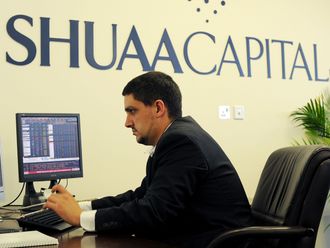Washington: The trading losses at Knight Capital Group Inc renewed pressure on US regulators to prove they are equipped to protect investors in markets that are increasingly computerised and fragmented.
The software problem, which disrupted the market opening August 1, has cost Knight $440 million and left the company looking for a financial infusion. It comes on the heels of other high-profile technological lapses that botched the initial public offerings of Facebook Inc and Bats Global Markets Inc.
While the Securities and Exchange Commission has issued a flurry of rules aimed at lowering rapid market swings, some former regulators, market participants and lawmakers said the measures don’t go far enough. They called for the agency to bolster its stable of experts, tighten oversights and intensify its focus on high-frequency trading.
“Things like this call the attention of regulators and people on the Hill to what really goes on in these markets -and they’ve been ignoring this stuff for years,” said Bill Brown, a professor at Duke University School of Law and a former managing director at Morgan Stanley. “I hate to say this, but I am glad the chickens are coming home to roost now before they end up doing too much damage.”
SEC Chairman Mary Schapiro, whose agency is the main market overseer in Washington, today described the Knight event as “unacceptable,” and promised to issue regulations to help prevent similar mishaps.
Accelerating Efforts
“I have asked the staff to accelerate ongoing efforts to propose a rule to require exchanges and other market centers to have specific programmes in place to ensure the capacity and integrity of their systems,” she said in a statement. The chairman also said the agency will hold a public meeting with industry participants in the coming weeks “to discuss further steps that can be taken to address these critical issues.”
Representative Maxine Waters of California, a senior Democrat on the House Financial Services Committee, said the panel should hold hearings to get to the bottom of the turmoil.
“Though we don’t yet know precisely what caused the problem with Knight Capital, with a drumbeat of financial market snafus continuing, it’s clear that the industry, with guidance from regulators, needs to strengthen their internal controls,” Waters said.
“Like the problems with the Facebook initial public offering, events like this only further serve to undermine investor confidence in the markets,” she said.
‘Disturbingly Vulnerable’
Representative Brad Miller, a North Carolina Democrat on the Financial Services panel, said the Knight incident makes him think that markets are “disturbingly vulnerable” and worry that “the technology is not as reliable as we need.”
The SEC fuelled the march to electronic trading when it passed rules in 2005 designed to drive down costs for investors and increase competition with the then-dominant New York Stock Exchange. Now about 50 venues get trades that are mostly handled by computers.
A growing number of critics say the policy may have worked too well, fostering so much fragmentation that the SEC and other market cops can’t get a handle on what is happening in far-flung trading venues until it’s too late. Buying and selling stocks is cheaper and faster, but it also can be much riskier.
“Do we really think of the SEC as in control of the markets anymore?” said James Fanto, who teaches securities law at Brooklyn Law School.
Traditional Exchanges
Fanto said that when the traditional exchanges dominated trading, the SEC gave at least the appearance of having consistent oversight. That’s no longer the case, he said.
“It’s partly that they don’t have the resources and can’t attract the people who could follow all this. It’s hard to do. I think it just adds to the sense that they don’t know entirely what’s going on either,” he said.
Arthur Levitt, a former SEC chairman, said the trading system “needs greater transparency, and in the past few years, it has become less transparent than ever.”
Now an adviser to Goldman Sachs Group Inc and Getco LLC, a Chicago-based automated trading firm, as well a Bloomberg LP board member, Levitt said the SEC and the Commodity Futures Trading Commission should set up an official review of technology and market structure to show the public “what the risks are in a clearer way.”
2010 Disruption
The biggest trading disruption came in May 2010, when a 20- minute plunge in stock prices temporarily erased $862 billion of market value. A report by the SEC and the CFTC pinned the decline partly on an algorithm employed by one firm trading stock futures.
The SEC has opened an inquiry into the Knight incident.
Regulators say that Knight’s problems haven’t disrupted the financial system. They were triggered by what Chief Executive Officer Thomas Joyce called “a bug, but a large bug” in software as the company, one of the largest US market makers, prepared to trade with an NYSE programme catering to individual investors.
“Technology breaks,” Joyce said in an interview from Jersey City, New Jersey-based Knight on Bloomberg Television’s “Market Makers” programme with Erik Schatzker and Stephanie Ruhle yesterday. “It ain’t good. We don’t look forward to it.”
Dark Pools
The SEC has moved under Schapiro to get a better handle on the changes to the markets. In January 2010, before the so- called flash crash, the agency issued a paper seeking comments on a wide range of issues, including high-frequency trading and dark pools, markets that don’t display price quotations.
It also implemented circuit breakers for individual stocks and approved regulations laying out the rules for breaking erroneous trades in late 2010. At least five stocks were halted on the NYSE during the first 35 minutes of trading Aug. 1, according to data compiled by Bloomberg. Still, dozens of stocks swung more than 10 per cent.
In June, the agency said it approved two plans to lessen the chances of sudden market swings. One system, known as limit- up/limit-down, prevents trades at prices outside a specified range. The other plan made it easier to trip the market-wide circuit breakers, introduced after the 1987 crash, that are designed to halt trading during routs.
Those rules don’t go into effect until February 2013.
Monitoring Activity
The agency also passed a rule in July requiring exchanges to build a system to monitor and analyse trading activity. Known as a consolidated audit trail, it will enable examiners to reconstruct market crises and expedite surveillance.
Levitt was among critics who said the system should capture data in real time - rather than after the fact - so regulators could potentially catch disruptions before they run out of control.
Representative Barney Frank, the top Democrat on the Financial Services committee, said that the SEC and CFTC need more funding to do their jobs.
“Technology advances, things get more complex,” Frank, of Massachusetts, said on Bloomberg Television. The agencies have “to hire very smart people, they’ve got to have first-rate information technology.”
Representative Scott Garrett, a New Jersey Republican who is chairman of the Financial Services subcommittee that oversees capital markets, said he planned to wait for regulators to fully understand what occurred before making judgments about hearings or legislation. Knight’s Joyce testified before Garrett’s panel in June.
Fail-Safe System
“My reaction is to see what the SEC comes up with,” Garrett said, noting that the committee had a hearing on the May 2010 event before regulators had completed their review and it yielded little usable information. Still, Garrett added, “I don’t know that you can come up with a fail-safe system.”
Joyce, in his testimony in June, touted Knight Capital’s technology and data centers that “are some of the largest and most reliable in the industry.”
“Knight has spent the last 17 years evolving our technology infrastructure so that it can process millions of trades a day on behalf of the retail investor - in a fast, reliable, cost effective manner - while providing superior execution quality and service,” Joyce said in his remarks.
James Angel, a professor at Georgetown University’s business school in Washington who serves on the board of exchange operator Direct Edge Holdings LLC, said Knight’s trouble “underscores that the commission cannot declare victory and go home” just because they have some new rules in the offing.
Bolster Resources
More to the point, said Angel, the SEC needs to bolster its “human and technological resources” so it can better understand what is happening.
“They need to hire people with technology backgrounds and they need to hire people with trading backgrounds; they need to hire plumbers,” he added. “Until the SEC has enough plumbers to really understand the market structure, they are going to continue to be a day late and a billion dollars short.”











